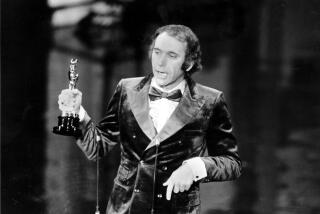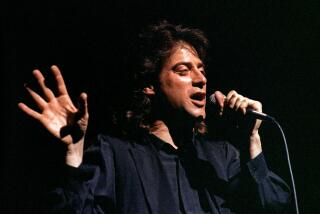Little Richard the Lionhearted
Little Richard--wearing flashy clothes, a foot-high pompadour and punctuating his lyrics with what would become his signature “Wooh!”--is working a crowd of young fans into an utter frenzy during a 1956 concert in the segregated South. The scene, re-created in an NBC movie starring Leon as the legendary singer, picks up as he screams, stomps and rips through his set, pausing only to wipe the sweat from his face with a pair of silky panties thrown at his feet.
Then with all the frenetic energy that made him famous, Little Richard tears off his shimmering shirt and coat, swings them over his head and tosses them into the crowd. But he isn’t finished. In a move meant to thrill his audience and enrage the nightclub owner, he drops his pants and stands grinning in gold lame briefs.
During the production of “Little Richard,” director Robert Townsend worried about the scene--that it might be a bit over-the-top, that executive producer Little Richard might not like it, that the network might think they’d gone too far.
“We were doing the scene and I was watching Leon twirling around in the monitors and everything was cooking,” he says. “All of a sudden I felt this finger digging into my shoulder. I turned around and it was Little Richard. He was screaming at me: ‘That’s how it was! That’s exactly how it was!’ ”
*
Sixty-seven years old and widely recognized as one of the architects of rock ‘n’ roll, Little Richard clearly enjoys recalling how it all started. There are plenty of good memories--the early gigs in Georgia juke joints, the hit records and adoring fans, the fast friendships and shared bills with the likes of Jimi Hendrix, James Brown, Sam Cooke and the Beatles.
In his role as executive producer of the movie based on his early life, the legendary singer has been doing a lot of reminiscing lately. Sitting in a Burbank conference room recently in a velvet shirt and full pancake makeup, his face both youthful and waxen, Little Richard recalls everything from the way he styled his pompadour in 1952 to the floor plan of the house in which his parents raised him and his 11 brothers and sisters.
It feels good to remember, but there’s plenty Little Richard would just as soon forget.
His early life was also marked by violent beatings by a father ashamed of his son’s effeminate appearance, strict codes of segregation that made performing a constant battle, and an industry that ripped off his music to be reheated for the masses by the likes of Pat Boone. Then, of course, there are certain sexual peccadilloes that the current member of the Church of God of the Ten Commandments doesn’t exactly care to advertise.
“I was what you called back in that day a freak,” he says. “I was flamboyant in every direction. I’m glad I’m able to look back on it and say, ‘Thank you, Lord,’ and go on. I’m just glad I don’t have to do that no more.”
Documenting these extremes--the thrilling and the terrifying, the sacred and the profane--is the balancing act of “Little Richard,” the bio-pic that traces his rise to stardom and decision in 1957 to quit the business and devote himself to his church. It is a decision that would turn out to be temporary.
Townsend, whose theatrical credits include “Hollywood Shuffle” and “The Five Heartbeats,” says the challenge in telling this story was capturing and making some sense of the phenomenal energy that Little Richard’s biographer Charles White likened to a quasar--”the most intensely radiant object in the cosmos.”
“A lot of times people only see a couple of notes in Richard--you know, the ‘wooh!’ ” Townsend says, breaking into Little Richard’s ecstatic vocal exclamation mark. “I really wanted to capture the soul of the man, the layers. How did this little kid from Macon, Ga., become Little Richard?”
*
By the time he was 25, the man born as Richard Penniman had helped lay the foundation for much of the early rock ‘n’ roll to follow with a string of hits including “Tutti-Frutti,” “Long Tall Sally,” “Good Golly Miss Molly” and “Lucille.” As groundbreaking as his records were, inspiring everyone from Mick Jagger to Elvis Presley, his place in public life was even more ahead of its time. Sexually ambiguous, loudmouthed and just plain noisy, Little Richard was like a visitor from another planet transported to the segregated South of the 1950s. Decked out in foot-high hairstyles and mirrored suits, Richard hollered and pranced like nothing anyone had ever seen before.
Those early performances are re-created in the film with the accompaniment of original Specialty Records master tapes and elaborately choreographed routines with Little Richard’s band the Upsetters. Townsend says he took just as much care in creating the movie’s dramatic moments, including the death of the singer’s abusive father and his gradual religious awakening.
The often-conflicting sides of Little Richard are captured vividly by Leon, a tall and expressive actor last seen on NBC as singer David Ruffin in the miniseries “The Temptations.” The high ratings for that series helped pave the way for this project, though Leon says he was initially reluctant to take it on.
“It’s one thing playing a real person who is dead and gone,” he says. “It’s quite another playing a living person who is not just alive--he’s alive and screaming.”
But Leon says he was convinced to take the role after reading Daniel Taplitz’s soulful script and meeting with Little Richard at his home in Los Angeles. “As an actor, I couldn’t find a better showcase,” Leon says. “You talk about people stretching from one part to the next--here I’m doing it all in two hours. I’m a preacher, a flamboyant rock ‘n’ roll artist, a lover boy, a mama’s boy. What’s left?”
After signing on, Leon contacted his friend Townsend--he had co-starred with the actor-director in “The Five Heartbeats”--about directing the project. From the start, Townsend says he wanted to tell a sympathetic story without sugarcoating some of its more difficult details. And while the film doesn’t include some of the more lurid episodes described in Little Richard’s 1984 biography--there’s no mention, for instance, of the lewd conduct arrest that prevented him from performing in his hometown for several years--it does suggest a private life that flouted moral codes of the time. That wasn’t always easy with the legendary performer signing off on script changes and overseeing nearly every detail of production.
“You don’t want to step on his toes,” Townsend says. “He’s a legend, a living legend--so I’m not going to turn around and say, ‘No, I’m not doing it that way.’ Hell no!”
But Townsend says everyone involved, including Little Richard, agreed that the story would work best if it included his life on stage and off. Which meant mixing high-intensity musical numbers with scenes of Little Richard cavorting in drag and, in one scene, encouraging a couple of groupies to kiss for his enjoyment.
“If you’re watching the story, you get that he likes men and he likes women,” Townsend says. “We could have copped out and not addressed that at all. . . . We walk a line because this is network television. But we push the envelope. At certain points, it gets pretty uncomfortable. Then it’s a party, then it’s sad. It’s a ride.”
*
Little Richard himself says his sexuality has always defied easy categorization. “I love people, period,” he says. “I wouldn’t tell you I never saw a nice-looking man--it doesn’t mean I wanted them sexually. My main interest was women. I liked to have a good time with a lot of women. I didn’t want one--I wanted 100. The girls would come and stay all night, the boys would come and stay all night. We did what we did. We did what young boys and young girls would do. We had a good time.”
And Leon says it would be a mistake to look at Little Richard’s story from either a straight or gay perspective. “He’s the world’s most famous pansexual,” he says. “He’s not so concerned with gender as he is with beauty.”
And as the film takes care to point out, Little Richard’s sexuality was just as much a calculated strategy as it was an expression of self. In one of the film’s most powerful moments, a scene aboard Richard’s tour bus that was added to the original script at the urging of Leon, one of the musicians complains about having to doll up in “sissy makeup” before a performance at a large hall in Greenville, S.C. The singer suddenly stops cold: “You know how many coloreds play here? None. I am the first. I am the only. You want to call me a sissy, go ahead. Knock yourself out, boy. But you make sure to call me a rich sissy.”
It was his very “sissiness,” Little Richard believes, that helped build a widespread audience for what was then called “race music.”
“James Brown and other black singers couldn’t play most clubs because white guys were intimidated by their presence,” he says. “But when you had on the makeup, they weren’t intimidated because they felt you were into the gay life and that you wouldn’t bother their women. We had to wear makeup to play those clubs. It was a decoy.”
It’s been almost 50 years since Little Richard first scandalized and electrified audiences, and he has at last won the recognition (if not the royalties) he always claimed to deserve.
An early inductee to the Rock and Roll Hall of Fame, he now balances a year-round touring schedule with church work--most Saturday afternoons he can be found on Hollywood Boulevard, passing out signed photos and religious literature from the back window of a white stretch limousine.
And while reliving his past can be difficult, Little Richard says he is glad to be alive to see his story reach a popular audience. “We don’t know where death is,” he says. “I’m just glad I’m around to see the reaction of people to this movie. I know that when I saw it, I wanted to cry and cry. I can feel it all like it was going on all over again. It’s a very deep feeling. It’s my life.”
*
“Little Richard” can be seen tonight at 9 on NBC. The network has rated it TV-14 (may be unsuitable for children younger than 14).
More to Read
Only good movies
Get the Indie Focus newsletter, Mark Olsen's weekly guide to the world of cinema.
You may occasionally receive promotional content from the Los Angeles Times.









